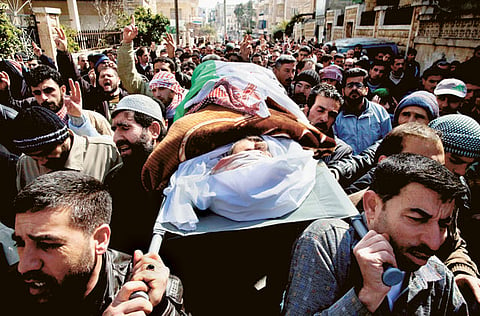No help in sight for Syrian protesters
Foreign powers' failure to stem violence risks spreading internecine strife across region

London As the death toll mounts in Syria amid a continuing crackdown on anti-government protests, calls are growing for some form of outside intervention. But with few easy options, foreign powers who find themselves unable to halt the suffering could simply end up prolonging it.
Earlier this week, US senator and former US presidential candidate John McCain called for US-led airstrikes to undermine the rule of President Bashar Al Assad.
The United Nations says at least 7,500 people have died so far in the crackdown.
With Al Assad believed to be receiving weaponry and support from regional ally Iran and long-term friend Russia, there are already signs the conflict may be becoming internationalised. The rebel Free Syrian Army is also acquiring smuggled small arms across porous borders with Lebanon and also perhaps Turkey, with Saudi Arabia and Qatar seen keen to provide more.
"The longer [Al] Assad keeps up this shocking crackdown, the more likely it is that the regime's war against civilians will become a civil war," says Aliah Brahimi, a senior fellow in Middle East politics at the London School of Economics.
"That internecine strife threatens to spill over and destabilise the region for a generation," Aliah said. In Libya, France joined with Arab states in organising weapons drops. Western powers seem reluctant to go that far in Syria, but seem ready to turn a blind eye to Arab arms shipments in the hope the Al Assad regime will gradually collapse. It might happen, but some warn such outside tinkering could ultimately end up making things worse.
Syria's uprising has long had a strong ethnic dynamic, with Alawites who have long owed their enhanced position to Al Assad's rule reluctant to abandon him.
Turkish talk last year of creating some form of "humanitarian safe areas" has now largely dried up, perhaps on the realisation that any such action would likely require the deployment of large numbers of Turkish troops. Some wonder whether it could come back on the table if very large numbers began to flee Syria, providing at least a way of keeping refugees outside Turkey's borders.
"One of the reasons talk of airstrikes has come back on the table is that no one can really see any other immediate options," says Dave Hartwell, Middle East analyst at IHS Jane's. "But that doesn't mean that they are particularly likely."
"The truth is that policy options are very limited but that should not be an excuse to justify bad choices," says Julien Barnes-Dacey, Middle East analyst at the European Council on Foreign Relations.



